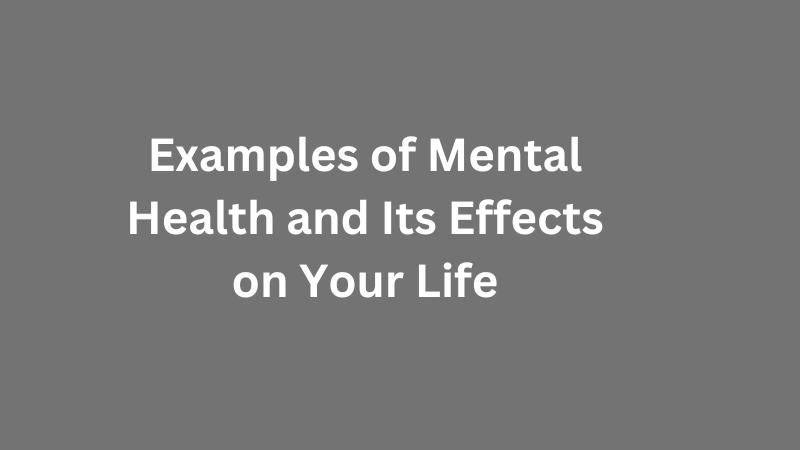Mental health is a state of emotional, psychological, and social well-being. It influences cognition, perception, and behavior, and affects how an individual deals with stress and challenges in daily life. It also influences the way an individual makes decisions and manages interpersonal relationships. Below are some examples of mental health and its effects on your life.
Mental Health Is A Dynamic State Of Internal Equilibrium
Mental health is a state of internal balance that allows an individual to function well in the world. It helps people recognize and experience emotions, function socially, cope with adverse life events, and maintain their identity and social roles. Imbalances in this state can lead to emotional and physical pain.
The term “mental health” has many different definitions. It may refer to a general state of well-being or to a specific state of psychological well-being. Generally speaking, the term “mental health” describes a state of well-being, characterized by the absence of mental illness or distress, and a state of flourishing. This definition may exclude a large segment of the population, such as adolescents and minorities.
A person’s mental equilibrium is continuously changing, requiring a new balance at different epochs. For example, adolescent crises, marriage, becoming a parent, and retirement all call for new mental equilibrium. During these epochs, a healthy individual may experience appropriate human emotions and can time-wise restore the state of internal equilibrium.
It Is Linked To Productivity
Recent studies have shown that employees’ mental health is closely tied to their productivity. According to the American Psychiatric Association, depression costs the U.S. economy an estimated $210.5 billion a year. Many employees are asking if the company they work for should be doing more to protect their mental health. Another study showed that workers spent less time concentrating and took longer to complete tasks during COVID-19, a time when the world was experiencing an epidemic of mental illness.
The American Psychiatric Association estimates that employees who have untreated depression lose as much as 35 percent of their productivity. Depression is the leading cause of job turnover and contributes $210.5 billion to the U.S. economy every year. However, many employees are reluctant to seek help for mental illness for fear of stigma and rejection. However, the truth is that mental illness does not discriminate based on gender, race, or socioeconomic status. In fact, it affects people of every age, gender, and socioeconomic status.
It Is Linked To Social Participation
Researchers have found that social participation has positive effects on physical and mental health. They have also found that social contact can influence the pathway to mental health treatment. However, these effects aren’t necessarily related to the actual utilization of mental health services. Some studies, however, have investigated the impact of social factors on help-seeking behavior. These findings suggest that mental health is closely linked to social participation. However, more research is needed to determine the exact relationship between social participation and mental health.
In the current study, people who are more likely to participate in social activities were more likely to seek mental health consultations. This finding is promising because it points to a link between social participation and mental health consultation. However, future research is needed to understand the time frame and dynamics of social participation. This would help to mitigate retrospective recall biases and understand the relationship between mental health consultation and social participation. The researchers also hope that the findings will inform efforts to promote social participation and improve mental health outcomes.
It Is Linked To Education
Mental health issues affect the way children learn, and can interfere with their ability to focus in class. They may also have trouble starting and finishing assignments or they may worry that they’ll get them wrong. They may also avoid social activities or school altogether. Educators need to take mental health issues into account to ensure that children have the tools they need to succeed.
Higher education has been associated with better mental health. Higher education also leads to more job security and higher earnings. While mental health education isn’t compulsory, teachers can help promote awareness among students and teach healthy coping strategies.
It Is Linked To Relationships
Studies have shown that the quality of a person’s relationships can significantly impact mental health. People with toxic relationships may have more mental health problems than those with healthy relationships. These unhealthy relationships often include a high level of stress. They can also negatively impact a person’s physical health. People who are in unhealthy relationships are more likely to have depression and suicidal thoughts.
if you are facing some serious issue then you can reboot your mind by getting escort services from an escort company. there are many companies that provide escorts in Lahore to treat mental problems.
A solid social support system is essential for improving adherence to treatment plans for mental illnesses. In fact, close relationships with healthy partners are linked to better mental health outcomes than those who are single. A healthy relationship with a partner encourages healthy habits.

